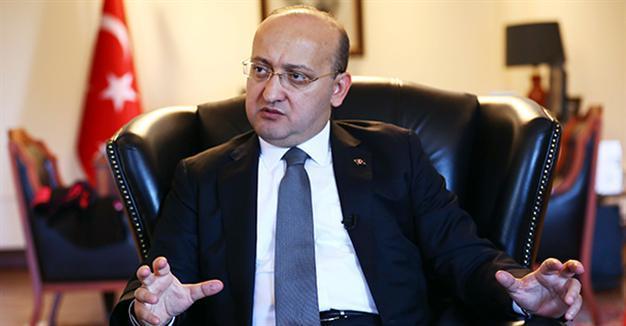Turkey says US pinning Syria strategy on ‘small terror group’
ANKARA – Agence France-Presse

Turkish Deputy Prime Minister Yalçın Akdoğan speaks during an interview at his office at Cankaya in Ankara on March 1, 2016. AFP Photo
Turkish Deputy Prime Minister Yalçın Akdoğan on March 2 criticized the United States over its Syria strategy, charging that it was relying on Kurdish fighters he described as a “small terror organization.”In an exclusive interview with AFP, Akdoğan also rejected suggestions Ankara is preparing any unilateral military intervention to end the five-year war in Syria.
Akdoğan said the United States had to see that the Syrian Kurdish Democratic Union Party (PYD) and its armed wing, the People’s Protection Units (YPG), were “arm in arm” with Russia and the Syrian regime of President Bashar al-Assad.
“I don’t believe it is a very correct approach for giant America to be relying on and hoping for help from a small terrorist organization and staking its entire Syria approach on this,” he said.
“YPG and PYD is part of the PKK. A change in the name does not change its nature. If you call an apple a pear, it is still an apple,” he added.
Turkey considers the PYD and YPG to be an affiliate of the outlawed Kurdistan Workers’ Party (PKK), with which it has been in armed clashes since the mid-1980s.
The issue has caused major tensions between Turkey and its NATO ally the United States, which has been cooperating with the YPG as the most effective fighting force on the ground against the Islamic State of Iraq and the Levant (ISIL).
Alarmed by YPG forces’ advance in northern Syria, Turkey last month shelled their positions in Syria, saying it was responding to incoming fire in line with its rules of engagement.
“Turkey is in a position to protect its national security. Turkey’s national security does not start from its border gate,” Akdoğan told AFP in his offices in the Çankaya Palace in Ankara.
Turkey has said a partial ceasefire in place in Syria since Feb. 27 should have excluded the YPG forces.
“Turkey will activate its own rules of engagement and defend itself if a threat is directed against it,” said Akdoğan.
No unilateral operation
Russia, Turkey’s arch foe in Syria since the shooting down of a Russian war plane by Turkish jets on Nov. 24, 2015, has raised alarm that Ankara was preparing a ground invasion - an idea rubbished by Akdoğan.
“Turkey will not launch a unilateral operation. Turkey is not a country to jump into an adventure. It is not a belligerent country.”
He said a “comprehensive” step was needed by all allies that would fight not just ISIL but also the regime of Assad, which Ankara vehemently opposes.
But Akdoğan acknowledged Turkey was seeking to create an eight- to 10-kilometer “humanitarian aid belt” between its border gate and the Syrian flashpoint town of Azaz to house refugees.
Turkey, now home to some 2.7 million Syrian refugees, has long pressed for a safe zone, backed up by a no-fly zone, to protect its borders and provide shelter for refugees on Syrian soil.
Thousands of refugees massed along the Turkish border after the regime’s offensive last month in northern Syria backed by Russia’s airstrikes.
Akdoğan said Turkey’s “open-border” policy remained in place and an estimated 150,000 Syrians were housed in 10 camps on the Syrian side of the border.
EU’s remarks on shutting of borders ‘contradicting’
Akdoğan said Turkey was left alone to deal with the refugee problem and added that it was a contradiction for the European Union to tell Turkey to keep open its southern border but to shut the western border.
“We said if a new refugee wave emerges, it will also hit Europe,” he said.
“Therefore it is essential that those people are sheltered on the other side of the border.”
But Akdoğan warned if conflicts and bombings continued and if a security risk emerged, from 150,000 to 800,000 Syrians might flock to Turkey.
Turkey last year concluded a deal with the EU to stem the flow of refugees in return for 3 billion euros but so far has yet to receive any of the money.
Akdoğan said Turkey had presented the EU’s rotating presidency the Netherlands with a project package for Brussels to deliver some part of the package “without delay.”
He said the issue would be discussed at an EU-Turkey summit meeting on March 7.
“This needs to implemented urgently,” he said.
















